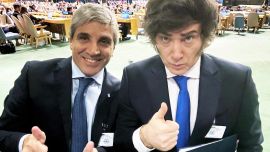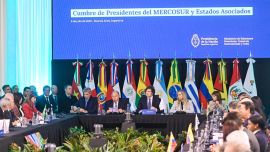Argentina’s foreign service rushed into service this week after its Ambassador to China, Sabino Vaca Narvaja, described a visit by the Speaker of the United States House of Representatives, Nancy Pelosi, to Taiwan as a “provocation” to Beijing and a “problem for the whole international community."
Foreign Minister Santiago Cafiero leads the efforts, seeking to clarify the country’s position after the remarks sparked diplomatic reaction. He said Argentina recognises Beijing’s “One China principle” stance that says Taiwan is a part of China, but wanted to “de-escalate conflicts” in general and support dialogue between the two nations.
"It has been 50 years since Argentina recognized the principle of China's territorial integrity, the principle of One China," Cafiero said in a statement.
Pelosi, a Democratic leader and speaker of the US House of Representatives, made a whirlwind visit on August 2 to Taipei, during which she assured that her country "will not abandon" Taiwan.
Pelosi’s visit to Taiwan triggered the wrath of China, which considers the island part of its territory.
In response, Beijing has conducted military manoeuvres around the island and suspended its collaboration with the United States in the fight against global warming and on some security matters.
"In China [the visit] was taken as a provocation, as our ambassador remarked, but the function of our country is to continue calling for the de-escalation of conflicts," insisted Cafiero.
Provocation
Vaca Narvaja had earlier described Pelosi’s trip as “a provocation and a problem for the entire international community."
The diplomat defended the concept of "territorial integrity" in the cases of both the Asian giant and Argentina’s sovereignty claims to the Malvinas Islands.
"That’s why we want to condemn this visit, joining the voices of Latin America but also of the United Nations. Just as our Foreign Ministry has expressed in every forum and multilateral organisation, Argentina backs the principle of one China and the concept of territorial integrity," he maintained.
"It’s the same principle whereby China also backs our sovereignty claims to our Malvinas islands and I wish to clarify that UN Secretary-General António Guterres himself has been very blunt in saying that the UN general resolution of 1971 ratifying the principle of one China is binding."
The Ambassador recalled that "most of the international community has ratified the principle of one China in this sense and criticised Pelosi’s attitude as interference in domestic affairs and a provocation."
"We understand the one China principle and we are pursuing the same concept of territorial integrity," remarked Vaca Narvaja, asking people "to watch out and condemn this type of provocation."
The ambassador said that owing to these similarities, Argentina "understands the Chinese protest very well and the negative impact on the construction of a more harmonious and balanced world order."
"We both pursue the concept of territorial integrity," he added, concluding: "Both China and Argentina will obtain this result by peaceful means because we are working jointly and the colonial epoch is over."
Pelosi’s visit to the island has taken US-China ties to their lowest point in years. In response to the visit of Pelosi, the second in the line presidential succession, China has deployed jet fighters, warships and ballistic missiles around Taiwan, which the analysts consider a simulated blockade and invasion of the island.
These manoeuvres permitted China to try out "the tactics of war systems based on information, perfecting and improving the capacities to destroy strategic island objectives with precision attacks," declared Air Force officer Zhang Zhi, as quoted by the Xinhua news agency.
The White House condemned the "irresponsible" conduct of Beijing and its military manoeuvres near Taiwan without ceasing to make every effort not to complicate any further a particularly tense relationship. According to Washington, Pelosi’s visit to the island does not change the policy of one China in any way.
"We don’t want a crisis, we don’t seek to provoke a crisis" with China, insisted National Security Council advisor John Kirby after asking Beijing to tone down the tensions in the region and abstain from its military manoeuvres.
– TIMES/PERFIL/AFP





















Comments